 VIRGINIA BEACH, Va. (AP) — The rampage at a Virginia Beach city government building was the latest in a string of high-profile mass shootings nationwide, between the high school killings in Parkland, Florida, and the Walmart massacre in El Paso, Texas.
VIRGINIA BEACH, Va. (AP) — The rampage at a Virginia Beach city government building was the latest in a string of high-profile mass shootings nationwide, between the high school killings in Parkland, Florida, and the Walmart massacre in El Paso, Texas.
As the tragedy nears its one-year anniversary Sunday, some victims’ family members feel it has effectively been forgotten after the national spotlight moved on to other mass killings, and more recently has been all but eclipsed by the coronavirus pandemic.
That leaves less pressure on authorities to provide definitive answers about why their loved ones died, they say, with the shooter’s motive officially still a mystery a year after he shot dead 12 people at the Virginia Beach Municipal Center before being killed by police.
City engineer DeWayne Craddock, 40, opened fire May 31, 2019, in offices where he had worked for more than nine years. Eleven co-workers and a contractor who was getting a permit died, four others were seriously wounded and a police officer received a bullet in his tactical vest but escaped serious injury.
The shooter had submitted his resignation the same day citing “personal reasons,” but city police investigators and an independent security firm that conducted an investigation know little about what drove him to go on his rampage, despite conducting hundreds of interviews and poring over thousands of documents.
The “answer to ‘why’ may be something we will never know,” city officials wrote in an April update on the probe.
Nixon and other family members of victims believe they have an inkling, however: What they call a toxic workplace environment and poor management by supervisors.
“I know what led to this,” said Nixon, who’s been among the most outspoken of the relatives. “It wasn’t random.”
It’s a notion echoed by Debbie Borato, sister of victim Missy Langer.
Langer had been harassed and bullied in the building, she said, and there was an office culture “that pushed that man over the edge.” Borato also said workplace security was lax.
City officials and Hillard Heintze, a Chicago-based security firm that conducted the probe, say claims of a toxic culture were not supported by the investigation.
Virginia Beach Vice Mayor James Wood said he “can’t begin to understand the grief” of the victims’ families, but investigators found nothing pointing to that.
“In any organization, not every single manager and employee does everything 100 percent the right way, all the time,” Wood said. “But if there was a systematic issue, if there was a problem, we would know about it.”
The investigation also found no prior warning signs that might have enabled the city to prevent the shooting.
Relatives told investigators Craddock had become isolated and described him as acting paranoid. He had gone through a divorce and was having trouble at work, saying in unwritten emails that he had been unfairly disciplined.
But the security firm could not explain how such “stressors” might have translated into violence, and investigators said last month there was still “no evidence to support what the suspect’s motive was.”
Police say they plan to release more information but not the full investigative file once it’s complete. That has angered Nixon and others, who say they will be looking to the findings of a state commission being formed to examine the shooting.
If the Virginia Beach rampage has gotten a bit lost in the popular consciousness, it’s perhaps in part because it occurred in a year that set a record for mass shootings, defined as involving four deaths or more: There were 33 of them in the country in 2019, according to a database compiled by The Associated Press, USA Today and Northeastern University.
Among the five mass shootings with over 10 dead in 2018 and 2019, most became part of larger narratives involving national and emotional issues. Two happened at schools in Florida and Texas, continuing a string of attacks on children, while shootings at an El Paso Walmart and a Pittsburgh synagogue were motivated by racism and anti-Semitism, respectively.
Office shooting sprees, experts say, while horrifying, typically do not resonate with Americans in the same way as more indiscriminate shootings at places such as movie theaters or concerts.
“Public interest and focus have a lot to do with whether people can see themselves as a victim, whether it could have happened to them,” said James Alan Fox, a Northeastern University professor of criminology, law and public policy. “If it happens in a workplace, people think, ‘That’s not like my workplace.’”
The sense that the shooting has faded to the background has only been heightened by the coranavirus pandemic. Concerns about large gatherings prompted city officials to plan a virtual ceremony Sunday instead of an in-person commemoration.
Borato said that even if the eyes of the nation are elsewhere, in Virginia Beach people remember.
“It was just another horrible shooting situation to the rest of the country,” Borato said. “So they have no interest in wondering why. Well, we do. Because those are our families. That was my sister.”



